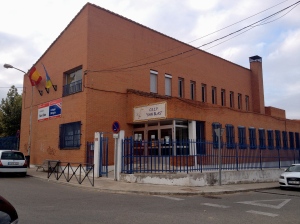I started teaching at the beginning of this month. I had visited the town once before to find my school and walk around a bit, so on the first day I knew where I was going. Or so I thought. I walked into my school and was greeted in English by a guy I later learned was José, one of the bilingual teachers. I guess it was pretty obvious who I was and where I was from. He informed me that there are actually two schools. Both are primary schools, but the school I was in is for grades 4-6 while the school I needed to head to to meet the bilingual coordinator was further down the road. This school is for grades 1-3 with a preschool nearby.

Here’s the view of my town from the bus I ride every day. Not sure why the photo looks different on one side.

Here’s where I usually get mobbed by kids trying to say hi to me during recess. Snapped this pic before they knew me hence the lack of mob.
Thus began many introductions to bilingual and nonbilingual teachers. And basically no one could pronounce my name. I know that “Lauren” is a pretty American name, so I wasn’t expecting to find many Laurens here, but I was fairly surprised how many people can’t say my name. I grew up with 4 other Laurens in my grade and my last name isn’t much harder to say, so I always considered my name pretty easy to pronounce. A few of the teachers had success, especially after I spelled it out for them, but the kids did markedly better. Laura is a somewhat popular name here so many teachers thought that was my name. For the most part, for very brief encounters, I use the name “Lorena.” But when I’m going to be with these people for 8 more months, it would be nice if they could say my name correctly.
So, after a meeting with my bilingual coordinator, I was off to the classroom. I work with 5th graders in the morning and mostly 1st graders in the afternoon (or what is afternoon to me since it is technically AFTER noon, but here it’s still “morning”). I have one class of 2nd graders and one of 3rd as well. I work Tuesday through Friday 9-2 (+commute) and always have three day weekends! Sometimes I have even longer if there is a holiday on Fridays. More holidays fall on Fridays here than Mondays, so I was happy to have this schedule. I actually had the option of choosing from three different schedules. Most of the teachers think it’s annoying having to switch schools every day, but I actually prefer it. I like working with different grade levels for the variety, don’t really mind the walk, and it was a schedule with Mondays off.
There are currently 4 auxiliares at my school (including me). One other auxiliar will be joining us soon. I don’t exactly know the whole story regarding why she is starting later, but I’m sure the teachers will be happy to have some extra help. Two of the girls were auxiliares at this school last year. For one girl, this is her FOURTH year doing this. She is in graduate school now though for bilingual education, so this year she’s working in order to pay for that. Here’s an example of how small a world it is: One of the girls has family in Shawnee Mission which is right next to my hometown and another girl has a good friend who is from Overland Park and went to the same high school as me. In fact she was a senior when I was a freshman. That definitely blew my mind.
My commute is a bit over an hour and of course the same on the way back. Luckily, I live near the metro stop I need to get on and from there I take the metro to the airport every day (which makes for some good people watching) then get on a bus that passes through the town I teach in. I get pretty motion sick on car and bus rides, so I have to take dramamine every day. It’s not always the most effective, but there is only so much you can do when the roads are extremely curvy and you go through at least 5 roundabouts. But this is the reality of my job, and knowing there are people with even worse commutes is comforting in a slightly sadistic way.
Anyway, back to teaching. Here are my observations so far* (some more positive than others…):
*Note that these observations are solely about MY school and may not be representative of the Spanish school system as a whole. There’s my disclaimer.
1) Álvaro is a very popular name for boys here. I have 8 different classes and am pretty sure there is an Álvaro in each. As for the girls, Paula seems fairly popular. And then there are the names I have never heard: Aitor, Damaris, Jesmadi, and Nerea. But what can I say? My name is strange here.
2) The teachers have a different philosophy regarding teaching. My mom can attest that I went on an hour long rant about the school system here, and it wasn’t exactly positive. Granted, I called her about this after 3 days of teaching, but a good part of my observations have held true. I get pretty passionate about classroom dynamics and teaching styles, so I may have been overly harsh. I also have a psychology background which definitely influences my perceptions. Mental health or special education is not focused on at all. Teachers openly criticize or punish students in front of their peers. Here are some things I’ve heard the teachers say very audibly, “She’s very slow. I don’t know what’s wrong with her.” “This one has problems.” “Class, tell me who didn’t do their homework today.” Now I’m pretty sure I learned in a psych class that positive reinforcement is always better than negative… Some of the students in reality should be working with someone like a para one-on-one. There doesn’t seem to be much of an effort to understand WHY certain students are acting the way they are. For example, one boy pulls out his hair (disorder known as trichotillomania if anyone is interested), and the teacher just dismissed this saying “I don’t get why he does that.” Well, here’s a guess: he’s nervous, he’s stressed, he’s antsy, he’s depressed, he’s obsessive-compulsive. I was shocked by the inattention to mental health at school, so I make an extra effort to talk to the kids, give them a chance, and in general, BE NICE (the number 1 thing I learned from my job at a psych clinic).
3) Teachers don’t always make the effort to learn kids’ names. As a former “blue squad number 2″ in gym class, I can relate to how demotivating it is when a teacher doesn’t know your name. Unfortunately, I am pretty terrible at remembering names. I have a habit of zoning out just as someone tells me his/her name. Much better with faces than names. But, some of the classes have rosters with pictures, and I make an effort every day to get some names down. I probably have close to 200 students though since I chose a schedule with varying grades, so I think I deserve a little bit of a credit for trying.
4) Coffee break time is very important but also very hard to integrate into. At 11:15 there is a 45-minute break time for teachers and recess for the students. During this time I switch schools and then can have free food and coffee. Before I started working, many people stressed how important it is to go to the coffee breaks and talk to teachers. I haven’t missed one yet, but it is fairly difficult to involve myself in the conversation. Not all the teachers are bilingual so the coffee break is entirely in Spanish. Sure it’s great for practice, but it’s also very difficult to follow at times since they all speak at their normal (rapid) pace. The teachers don’t typically ask me or the other auxiliares questions either. Usually by the time I think of something to say, the conversation has already moved on.
5) The kids believe that I don’t know any Spanish at all. So much that if I accidentally say the word”hola” they all go crazy and say, “SHE KNOW SPANISH! SHE KNOWS SPANISH!” It’s most difficult with the 1st graders since they barely know English. Many times I can understand what they want but can’t always respond. Typically though, they don’t seem to notice that I am responding to their questions they ask in Spanish. I always respond in English, but they haven’t made the connection that I have comprehension of Spanish and thus, it’s pretty likely I can speak it too. Luckily, with the 5th graders I can speak in English with few problems. And it’s pretty amazing how much the students have caught onto English by the time they’re in 3rd and then 5th grade.
6) Classes with younger kids are typically out of control, the teacher yells almost constantly, and punishment is pretty arbitrary. I am not responsible for disciplining the children, and thank god because 1st graders are constantly off task, running around, pushing each other, and yelling. And the teachers usually respond back by yelling. Is this a learned behavior then for the kids? I’ve thought a lot about classroom dynamics here, and all I’ve seemed to figure out is that somewhere between 1st and 5th grade, the student’s behavior improves drastically. Is it a result of teacher’s yelling? Natural maturation? That I happen to have a rare, well-behaved 5th grade class? Not really sure.
7) The 5th graders are relatively shy while 1st graders have absolutely no inhibitions. I have recently been working with 5th graders one-on-one to help them with an exam they will take next year. I take students out of class to answer some questions, and most of them respond robotically. I try to have some fun with them since if we get off-task it’s still in English, right? But they’re pretty shy. I figure though that I’m someone extremely new to them, they’re used to their structured class (sit down, say good morning, get out homework, do worksheet, write down homework, rinse and repeat), and in general it’s harder to express oneself in another language. I have had some standout students though that have really surprised me with their answers. One kid was able to tell me about his favorite book, Journey to the Center of the Earth, and what do you know, the other kid who gave pretty detailed answers is his twin (they look nothing alike so I guess they’re fraternal). Meanwhile, 1st graders will say whatever is on their mind (in Spanish) and have no problem interrupting class. They can be pretty cute though. Anytime they see me around school they yell my name and wave, which always brightens my day, and a lot of the girls love to give me hugs.
8) School is different here. Is that a good or bad thing? I’m not quite sure. I’ve never read the literature on student turnout across countries, but I’m sure that would make an interesting article search. I’m not going to say that the U.S. school system is far superior, just that I see some flaws and think more of an effort could be made. Obviously, this is an entirely idealistic viewpoint that doesn’t focus ion the reality of the demands of running a school. We’ll see if any of my opinions change by the end of the school year.









Thanks Lauren for your beautiful disertation on the Spanish school system and it’s idiosyncracy’s. I’m sure this is going to be a learning experience and one you will treasure the rest of your young life. Is the Spanish you encounter much different the Missou Spanish? I suspect they motormouth their Spanish and it hard to get in sync to comprehend easily. I found German to have enough english words that are derived from German to make it somewhat easy to get some idea of what they are talking about. Enjoy all you can as the months will fly by fast. Let your Ole Grandpaw know if youi need anything!
Love my Pretty Girl,
Papa Joe
LikeLike
Thanks for the read, Papa. The Spanish here isn’t by any means unrecognizable, but it’s definitely fast. And some of the accents are difficult to understand. Additionally, some words have different meanings here compared to the Latin American Spanish I learned in college, so I have to be careful about that. I’ve survived enough with my level of Spanish to get an apartment, open a bank account, and work through the bureaucracy of Madrid though!
LikeLiked by 1 person
Enjoyed your latest post!
LikeLike
Guess I should have named you Marta, 😀 (or Hermana). Enjoyed reading about your classroom observations. Sorry to hear you are having to take dramamine for the bus ride everyday.
LikeLiked by 1 person
You meeting people with a connection to KC and Overland Park in Madrid reminds me that “the world is a handkerchief”, as my friend Jose from Madrid would say.
He preferred that phrase to “it’s a small world”, which he thought was ridiculous because the world is not small, everybody knows that.
Love you Sweetie!
LikeLiked by 2 people
I’m so proud of you and your efforts to connect with your kids! The heart speaks volumes. Also, the maturation which takes place between k to 5 is incredible. Each grade definitely has its pleasures and challenges. I, too, love the spontaneity of the 6 year old set and the bonus hugs, but they have the attention span of gnats! Each week will get so much easier as you learn the routines and watch them mature month by month.
You’re right about positive reinforcement being the mindset of American education. Stickers, charts, classroom clips/clothespins to move up n down, party incentives work wonders. Nothing beats individual attention and care in the end though. Keep doing your part sweetie pie!
LikeLike
You’re exactly right! It’s amazing how quickly kids develop. Thanks for the read. Love your comments since you know just what it’s like!
LikeLike
Ditto all of your other replies. I’m wondering whether there is much difference between fairly rural and urban schools. All very interesting! How are you and your roommate doing? I’m so sorry you have such a long commute every day, but imagine there are many advantages in living in Madrid rather than in the village where you teach.
LOVE your blog. 🙂
LikeLike
I wonder too about the differences between rural vs. urban schools here. Most of the auxiliares I know work outside the city too, but I’ve heard from a few people how tough their city school is (mostly that the teens are bratty, haha). My roommate and I are doing fine! I’ve been baking (my next post!), and she loves it. As with my Spanish, some days I feel like I’m really improving and others I feel completely stupid. But we’re also trying to incorporate some more English in daily conversation for her, and on those days I feel pretty smart 😉
LikeLike
Hi Lauren! Thanks for all these details! It sounds fantastic! I wanted to let you know about motion sickness bracelets called “Sea Bands” I have. Hopefully you can get some too. I got them at CVS, but they are available in almost any drugstore. They come in a small box with 2 elastic bands about 1/2 inch wide. They have a small ball sewn in that you place on the inside of each wrist and it applies accu-pressure which in turn alleviates the motion sickness. And I think they REALLY work!! The instructions say to place the ball 3 finger widths from the big crease in your wrist, and between the 2 tendons. Let me know if you find them and if they work for you. I have had great success! Good luck!
LikeLiked by 1 person
Thanks so much for this information! I will check them out. Hopefully they’re easy to find here.
LikeLike
Let me know if you can’t find them, and I’ll mail some to you!
LikeLiked by 1 person